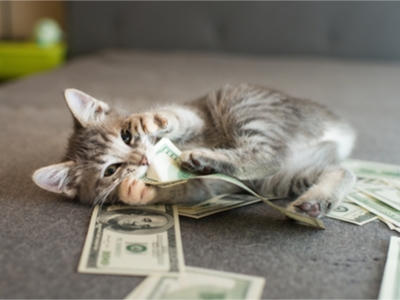
What do kittens, three-time NBA Finals champion Stephen Curry, and cryptocurrency have in common?
On May 7, 2018, a subsidiary of Launch Labs, a Canadian corporation doing business as Axiom Zen, released cryptocollectibles called “CurryKittens.” Cryptocollectibles are unique, digital tokens created using blockchain technology. The CurryKittens, a type of Cryptocollectible, were virtual kittens with the likeness of NBA star Stephen Curry. The CurryKittens were three of many virtual cats that could be securely bought, sold, traded, and bred on the multimillion dollar- generating CryptoKitties platform. (An image of the now suspended “CurryKittens” can be found here.)
In a complaint filed on May 16, 2018 under the federal Defend Trade Secrets Act, Founder Starcoin, a San Diego, California-based company, claimed that Axiom Zen, its once prospective business partner, misappropriated Starcoin’s trade secrets by using Stephen Curry’s likeness in the CryptoKitties platform. The basis for Starcoin’s claim was that it created the idea to use celebrities’ likeness in the cryptocollectibles marketplace, the idea was a trade secret, and the trade secret was shared with the defendant subject to a nondisclosure agreement. Two days after filing the complaint, Starcoin filed a motion for preliminary injunction seeking to enjoin the defendant from licensing with celebrities, athletes, entertainers, and musicians.
The Defend Trade Secrets Act permits district courts to enter injunctions to prevent actual or threated misappropriation. A plaintiff seeking a preliminary injunction must establish the following four elements: (1) he is likely to succeed on the merits, (2) he is likely to suffer irreparable harm in the absence of preliminary relief, (3) the balance of equities tips in his favor, and (4) an injunction is in the public interest.
In the instant case, on July 9, 2018, the Southern District of California denied Starcoin’s motion for preliminary injunction. Taking each element in turn, first, the court found that Starcoin had not demonstrated a likelihood of success on the merits. As a preliminary issue, the court found that the plaintiff had not carried its burden in showing that licensing digital collectibles based on athletes, entertainers and celebrities was an idea entitled to trade secrets protection. Next, the court found that even if the information were entitled to trade secret protection, the record demonstrated that the Axiom, not Starcoin, developed the idea to license digital collectibles using the likeness of celebrities first because the Axiom launched its product before the plaintiff had even demonstrated it had a product. Finally, the court reasoned that the release of CryptoCurry did not harm Starcoin because Axiom’s subsidiary had the exclusive rights to all CryptoKitties.
As to irreparable harm, the second element required for preliminary injunction, the court noted that without any sort of product or service in the marketplace, Starcoin had no customers or goodwill to lose. The court further noted that Starcoin failed to demonstrate that its loss of investors was due to the purported trade secrets misappropriation. Rather, the evidence showed that the investors were already in discussion with the defendant before any purported trade secret disclosure was made to the defendant.
Next, in weighing the competing claims of injury and considering the effect on each party of the granting or withholding of the requested relief, the court found that since defendant’s CryptoKitty platform was already competing in the marketplace, a restraint on their business would be a greater harm than to Plaintiff who had not demonstrated that it has a product.
Finally, in weighing the public consequences in granting the preliminary injunction, the court found that an injunction was not in the public interest because Starcoin had not demonstrated that it had a likelihood of success for a trade secret misappropriation claim.
Ultimately, the greatest factors weighing against Starcoin’s motion for preliminary injunction were the plaintiff’s failure to demonstrate that it created the idea first, and its lag in releasing the product to the marketplace. The court focused on Starcoin’s lack of a demonstrable product and consumer-base in three of the four elements considered in the motion for preliminary injunction. These facts proved to be fatal to Starcoin’s case. Indeed, seemingly abandoning the action, Starcoin filed a Notice of Voluntary Dismissal immediately following the publication of the court’s order. The district court’s decision is a reminder to all trade secret owners to document the development process, ensure that your nondisclosure agreements are drafted to achieve your goals, and where feasible, bring your ideas to market as quickly as possible.

